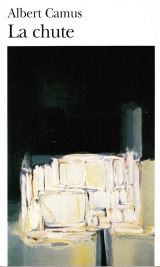I would like to begin this review with an outright statement about Albert Camus: he is an honest bloke. I didn’t meet him, I don’t know if he ever lied, if he cheated on his girlfriends, did something dishonest to make money, or any of those things we normal and still moral beings are bound to do at least once or twice a year. I don’t mean to say that he was a sort of angel come to earth to teach us about existence(ialism), but rather that he is an honest writer in the sense that he gets no pleasure at all from denouncing the ills of modern society or, for that matter, when he deals with that eternal companion of us called suffering. Camus was too sympathetic a person to celebrate human misery or to feel any satisfaction from beign the one opeing our eyes; he was definitely too good a guy to throw the first stone. When I read L’homme révolté I saw the person behind the philosopher, a person sad to admit that the estate born out of the ideology he had embraced so far killed people and honest enough with himself so as to speak out in spite of the enemies he knew he would earn (I am not saying that Camus was totally right here, I am just praising his honesty).
That honest man is still to be found in La chute. Now, honesty doesn’t turn whatever you say into “the truth” or even into something worth hearing. Well, for those who haven’t read the book I will only say it is basically about two men chatting in some dodgy bar in Amsterdam, the word “chatting” being in this case quite misleading because it is a monologue, and we know absolutely nothing about the non-speaking man (other than his being a really patient chap). I came across an interesting review in the shape of a dialogue in which this unknown man confesses to his wife that his trip to Amsterdam was a total pain in the neck because some self-important guy kept following him everywhere, talking about his former life in Paris when he was a successful lawyer and a dandy, and about how he had stolen an old painting and got elected as a pope in some concentration camp and a lot of stuff about philosophy and all men being guilty and what have you. I found this review quite funny and, in a way, I sometimes felt like that poor guy whose trip to Amsterdam was spoiled by Camus in disguise.
I wouldn’t say that I didn’t like the book or that I didn’t find anything suggestive or interesting in it, but I certainly struggled to relate to it. I was expecting something dealing with remorse, as I thought that the central episode of the book was the fall of a young woman into the Seine and how the main character failed to help her. This episode is in fact the turning point of our man’s life, but it does acquire an anecdotal dimension as the relation between it and the man’s real fall into the hells of Amsterdam is not as clear as I thought.
Of course, this is not a problem in itself. I guess that the problem is that rather than focusing on one philosophical problem, the book addresses a broad range of different issues that in the end always comes down to one of the most boringly recurrent tags: modern man’s ills. Modern man (and woman, possibly) is selfish, isolated from other beings, hypocritical, indifferent towards violence and injustice, etc… you know, those labels endlessly repeated book after book. That is why I have begun this review by saying that Camus is an honest man, that is, because I believe that he was sincerely concerned with those surely important issues. The difference might be that for millions of human beings those undeniable aspects of modern man (or should I just say “man” and remove the adjective?) are not the only ones that stand out when it comes to “live” within modernity, but also the examples of daily solidarity one sees on a daily basis in big cities, the actions carried out to help others and save them from loneliness and other such examples of caring and compassion. Evilness, indifference and loneliness are still a choice, probably as much as they have always been.
Now, of course, we have to deal with the fact that we do not live in a perfect world and also with that ultimate apparent contradiction, that we experience everything as individuals, but live in a society and a world beyond us and our experience. That makes possible to be hypocritical and selfish, to get angry and to fall into the hells desperation and suffering, because there is a difference between the reality as represented (ideals) and the reality as felt. The book’s only character, who has always prided himself on being on the side of justice, discovers that he was not really honest and that he was not only judgmental as most of his fellow human beings are, but also judged and punished (turned into a penitent).
There is a possible solution which makes me think of that anecdote attributed to Hobbes: he was known to have fathered a social theory in which individualism was the cornerstone. Once, after having given some money to a beggar someone brought to his attention that he was capable of altruism, to which Hobbes apparently replied that the ultimate aim of such act of generosity was not to relief the beggar’s suffering, but to feel better. So, why should we worry whether our generosity is genuine or not, if in the end the beggar gets his alms? Is not a society composed by an army of individuals pursuing their own happiness as good as any other? True, this too much of a mechanistic example of social engineering and the last thing I would like is to be linked to Bentham’s utilitarianism.
La chute is not properly a novel, at least not formally. There are no characters and there is not plot. Certainly, there is a story but that is not enough to make up a novel, for it is rather a confession which, surely, implies a number of events chronologically ordered. Some say that it is Camus’ own confession; I don’t know about that. Whatever the case, and whatever the impression one may get from it, it is certainly one thing: an example of an intellectually and emotionally honest piece of writing.


